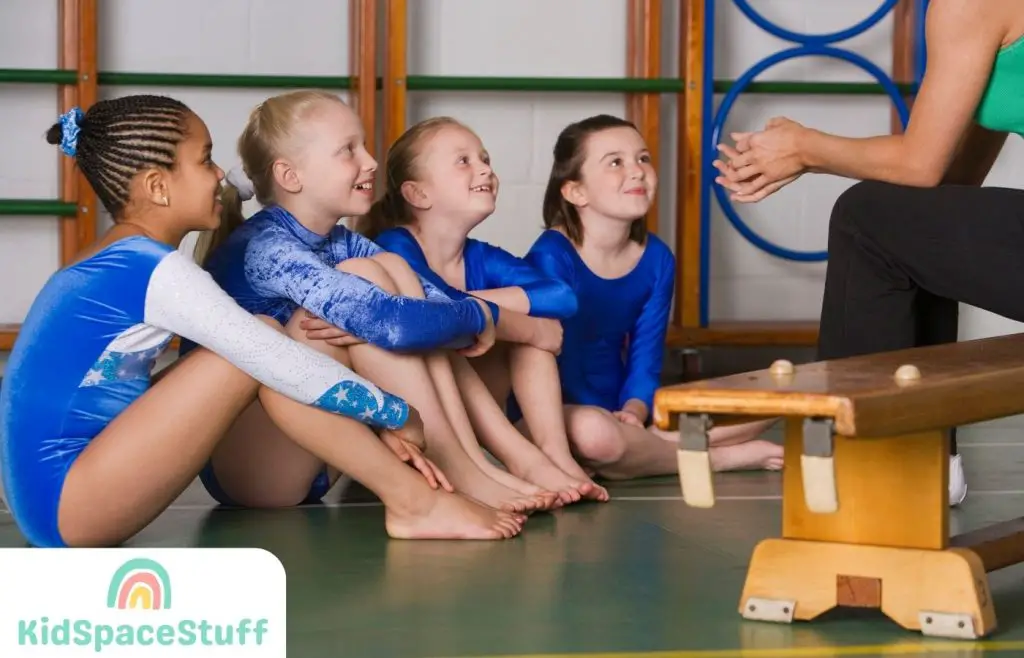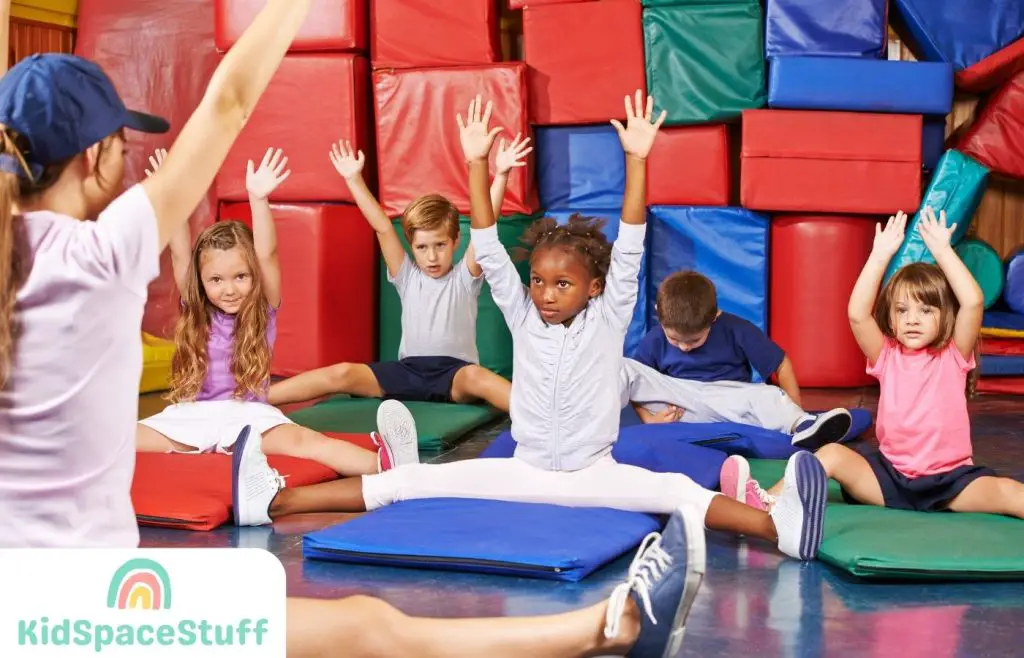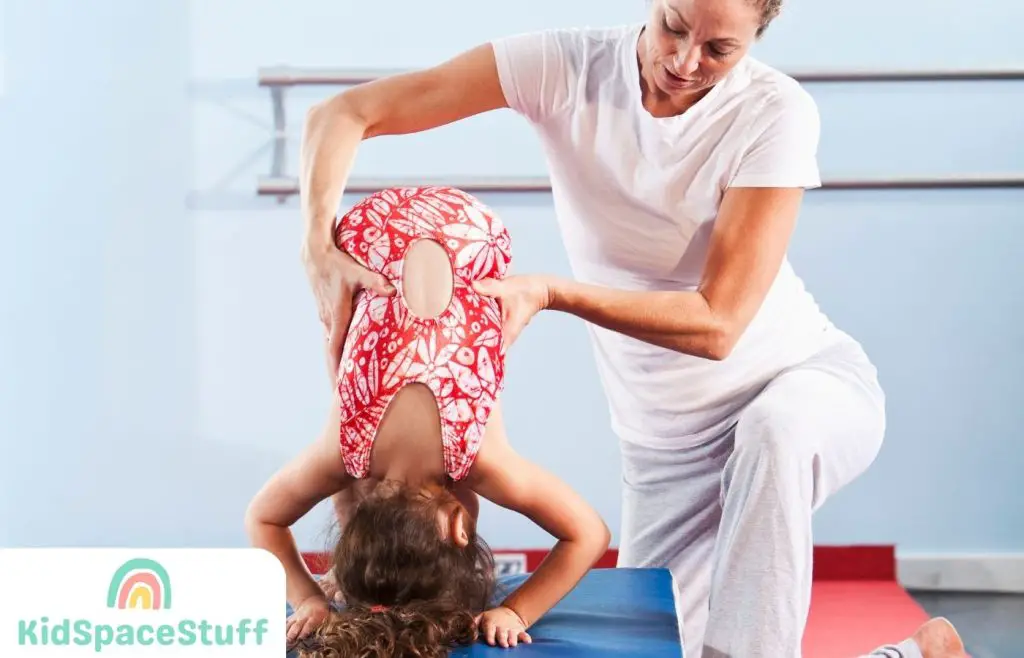As a parent, I constantly found myself wondering about the right age for my child to start exploring various activities, particularly gymnastics.
With its promise of strength, flexibility, and discipline, gymnastics caught my interest. But, how early can children really start? Is there a ‘too early’ when it comes to this sport?
I’ll dive into this question and uncover when kids can start learning gymnastics safely, some tips for starting gymnastics, and much more. Let’s dig in!
When Can My Child Start Gymnastics?
When it comes to enrolling a child in gymnastics, parents often wonder what the ideal age is to start.
While there is no definite answer, various factors can help determine the most suitable age for a child to begin gymnastics training.
Gymnastics classes are available for children as young as 2 years old.
However, many coaches suggest that children of this age are too young to fully understand instructions and properly participate in classes. They recommend waiting until a child is around 5 or 6 years old before enrolling them in a more serious gymnastics program.
For younger children, such as toddlers, it’s important to find introductory classes that focus on developing body awareness and fostering a love for the sport. At this stage, the goal is to keep activities fun and engaging, making it a positive experience for the child.
As children grow older and more capable, they can begin to participate in more advanced gymnastics classes. It’s important to note that, for competition in senior-level events, gymnasts must be at least 16 years of age, or turning 16 within the calendar year similar to other sports like boxing. The main idea is to provide a gradual and enjoyable learning curve, ensuring that students do not feel overwhelmed or discouraged.
Ultimately, the ideal age for starting gymnastics varies depending on the child’s readiness, physical abilities, and interest in the sport. Parents should observe their child’s growing capabilities and preferences, and then make an informed decision about when to begin formal gymnastics training.
The Benefits of Gymnastics for Kids

Gymnastics offers a variety of benefits for kids, ranging from physical to mental and social aspects. This section will discuss some of these benefits, focusing on the development of a child’s coordination, strength, focus, balance, and self-confidence.
Physical Benefits
One of the main reasons parents enroll their kids in gymnastics is for the physical benefits it offers. Gymnastics helps in developing a child’s strength, coordination, and balance through various exercises and training routines. Moreover, practicing gymnastics enhances body awareness, motor skills, and hand-eye coordination. Overall, gymnastics contributes to increased physical fitness and agility, promoting a healthier lifestyle for young athletes.
Mental Benefits
Beyond the physical advantages, gymnastics also has a positive impact on a child’s mental development. Participation in gymnastics helps kids improve focus, concentration, and discipline, as they are required to pay close attention to instructions and follow specific routines. Additionally, gymnastics training teaches persistence and determination, as children learn to overcome challenges and face their fears while attempting new skills and techniques.
Social Benefits
Finally, gymnastics provides kids with opportunities to develop important social skills, such as teamwork, communication, and sportsmanship. As children work together in a group setting, they learn to support and encourage one another, fostering a sense of camaraderie. Additionally, gymnastics helps build self-confidence, as kids can gain a sense of accomplishment when they master new skills or perform well in competitions. Overall, participation in gymnastics can aid in the development of essential life skills that will benefit children throughout their lives.
Here’s a great video exploring more of the benefits of gymnastics!
Types of Gymnastics Classes for Kids
Gymnastics can be a fun and rewarding sport for kids to participate in. There are different types of gymnastics classes available, each catering to specific age groups and skill levels. In this section, we’ll discuss two main types: Recreational Gymnastics and Competitive Gymnastics.
Recreational Gymnastics

Recreational gymnastics classes are designed for kids who want to explore the sport and develop their skills in a casual, non-competitive environment. These classes often start with toddler classes for children as young as 2 years old. However, many coaches suggest it’s better to wait until a child is 5 or 6 years old before enrolling them in a serious gymnastics program.
In recreational classes, children are exposed to a variety of equipment and activities, such as floor exercises, balance beams, and trampolines. The primary focus is on building body awareness, basic skills, and fostering a love for the sport. Recreational gymnastics is suitable for children of all ages and abilities.
Competitive Gymnastics
Competitive gymnastics is for kids who show a strong interest and aptitude for the sport and are willing to commit to a more intense training schedule. These classes are typically available for children who have reached a certain skill level in recreational gymnastics.
In competitive gymnastics, kids are grouped according to their age and ability, following specific competitive programs designed to help them advance through the ranks. These programs may include training on all apparatus, such as bars, vaults, and balance beams, as well as developing routines for competitions. The expectations for performance and commitment are higher compared to recreational gymnastics, and the participants are often required to compete in regional or national events.
Choosing between recreational and competitive gymnastics depends on your child’s interest, goals, and skill level. Either way, gymnastics can provide a fun and rewarding experience, promoting physical fitness, discipline, and self-confidence.
Essential Gymnastics Skills for Kids
Gymnastics is an excellent way for kids to stay active and develop essential skills needed for a healthy lifestyle. This section will discuss basic, intermediate, and advanced skills that children can learn as they progress in their gymnastics journey.
Basic Skills

When kids start gymnastics, they begin by learning basic techniques to build a solid foundation. These skills include rolling, cartwheels, handstands, and basic flexibility exercises. Incorporating these skills in their practice helps improve their muscle memory, making it easier for them to learn more complex moves as they advance.
- Rolling: Forward and backward rolls teach kids essential body control and coordination.
- Cartwheels: This skill helps kids develop balance, spatial awareness, and confidence in their abilities.
- Handstands: Practicing handstands helps in building upper body strength and body awareness.
- Flexibility: Stretching exercises increase flexibility, allowing for a greater range of motion and preventing injuries.
Intermediate Skills
As kids progress and become more comfortable with the basics, they can start learning intermediate skills such as back walkovers, front handsprings, and round-offs. These techniques further shape their abilities and prepare them for more advanced moves later on.
- Back walkovers: This skill requires flexibility in the back and builds the foundation for more complex techniques like back handsprings.
- Front handsprings: A front handspring involves jumping and flipping forward, landing onto their hands and springing back up to their feet.
- Round-offs: The round-off is a crucial skill for connecting various moves together while building momentum for flips and somersaults.
Advanced Skills
After mastering intermediate skills, young gymnasts can start learning advanced techniques, such as aerials, back tucks, and full-twisting layouts. At this level, kids might develop an interest in becoming more involved in elite gymnastics or aiming for the Olympics. It’s crucial to prioritize proper form and safety while practicing these skills to minimize risks and prevent injuries.
- Aerials: A no-handed cartwheel that showcases the gymnast’s strength, balance, and flexibility.
- Back tucks: A back flip where the gymnast tucks their knees towards their chest while in mid-air.
- Full-twisting layouts: This skill involves executing a back handspring and performing a full spin in the layout position, demonstrating both physical strength and aerial awareness.
By learning and mastering these different skills, kids can develop a strong foundation in gymnastics, paving the way toward more professional opportunities and a lifetime of healthy activity.
FAQs
At what age do most kids begin gymnastics classes?
Most children start gymnastics classes between the ages of 4 and 7. Starting at this young age helps kids develop agility skills, fine motor skills, and a love for physical activity. Plus, learning gymnastics early can pave the way for a healthy lifestyle while also setting a solid foundation for more advanced training in the future.
What is the minimum recommended age for children in gymnastics?
Gymnastics can begin as early as 1 to 3 years old. These classes for young children, often called “toddler tumbling” or “parent and me” classes, focus on developing body awareness, balance, and basic motor skills in a fun, engaging environment. The goal at this age is less about learning gymnastics and more about exploring movement.
Is there an ideal age range for starting gymnastics?
Many coaches consider the optimal age for beginning serious gymnastics training to be between 6 and 13 years old. This age range allows for a balance between a child’s physical development and their ability to follow directions and commit to regular practice. However, the best age varies significantly depending on individual readiness and interest.
Are young children, like toddlers, able to participate in gymnastics?
Absolutely, toddlers can and do participate in gymnastics. There are specific gymnastics classes designed for young children to help them develop fine motor skills, hand-eye coordination, and an understanding of their bodies in a safe, structured environment. Starting at such an early age can foster a lifelong love for the sport.
How late is too late for a child to begin gymnastics?
It’s never really “too late” to start gymnastics. While younger kids might have the advantage in developing certain gymnastics skills, older children and even adults can benefit immensely from gymnastics training. The sport can increase strength, flexibility, coordination, and self-esteem. Although becoming a competitive gymnast might be more challenging with a late start, the sport is still enjoyable and beneficial.
Final Thoughts
So, when can kids start gymnastics lessons?
Kids can start beginning gymnastics lessons as young as the age of 2, but more advanced classes will be taught between the ages of 5 to 7.
Remember, gymnastics is a sport that takes time to master – so don’t expect your child to learn gymnastics in a few months. It’s important to encourage them and give them all the support they’ll need.
Have other health related questions? Check out these guides~!
KidSpaceStuff is a site dedicated to helping parents find the best interior design, activities, and inspiration for their kids.